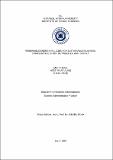Please use this identifier to cite or link to this item:
http://hdl.handle.net/11547/9239| Title: | RENEWABLE ENERGY POLICIES FOR SUSTAINABLE BUSINESS: COMPERATIVE STUDY BETWEEN EU AND TURKEY |
| Issue Date: | 2019 |
| Publisher: | ISTANBUL AYDIN UNİVERSİTY |
| Abstract: | Using energy effectively is important to achieve the goal of sustainable development. In the world today, energy consumption is increasing rapidly due to rapid increasing of world population. Therefore, energy demand is also increasing for urbanization, industrialization, widespread use of technology and electronic products, etc. Thus, the energy supply security become important. Countries has explored new renewable energy resources in order to reduce their dependence on fossil fuels imported from oil producing countries. On the other hand, energy sources can be obtained directly or indirectly from nature. However, with the increase of the world's population, natural resources are being destroyed and the climate is undergoing a major change. Therefore, it is important for both individuals and institutions to learn the value of energy and to have the knowledge how to use energy more effectively. The aim of this study is to investigate the importance of the businesses operating in the renewable energy field to ensure sustainable economic development, and the adequacy of government support provided to these businesses in terms of Turkey by comparing with EU energy policies. In the first part of the study, the importance of renewable energy and the purpose of the study is stated. In the second part, the energy resources conditions and the types of traditional and renewable energy sources are explained. In the third part, sustainable development, energy market, energy demand, energy prices, and the effects of renewable energy on economic growth are discussed. In the last part, Turkey and EU energy policy are revealed. Then the government incentives provided to enterprises operating in the field of renewable energy in Turkey are examined in comparison with the EU countries by using the datas of Turkish Statistical Institute (TUIK), Turkey Ministry of Commerce, International Energy Agency, European Commission, OECD and World Bank. Finally, the findings of the study are evaluated and certain recommendations are made. |
| URI: | http://hdl.handle.net/11547/9239 |
| Appears in Collections: | Tezler -- Thesis |
Files in This Item:
| File | Description | Size | Format | |
|---|---|---|---|---|
| 10299007.pdf | 2.92 MB | Adobe PDF |  View/Open |
Items in DSpace are protected by copyright, with all rights reserved, unless otherwise indicated.
